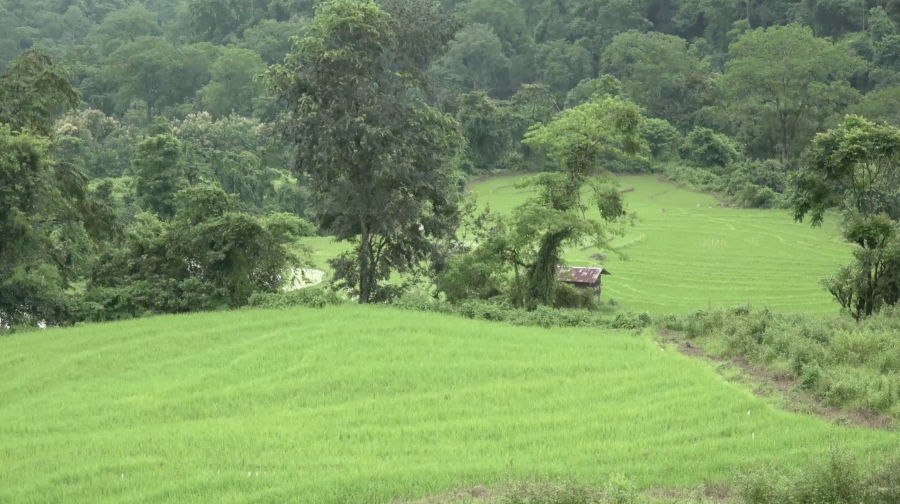 Paddy fields in Samdrup Jongkhar’s Khengkharwoong are finally being revived after lying fallow for over four years. With the irrigation channel now repaired, farmers have resumed paddy cultivation, bringing hope to the community. However, the threat of wild animals continues to cast a shadow over their efforts.
Paddy fields in Samdrup Jongkhar’s Khengkharwoong are finally being revived after lying fallow for over four years. With the irrigation channel now repaired, farmers have resumed paddy cultivation, bringing hope to the community. However, the threat of wild animals continues to cast a shadow over their efforts.
Tshewang Tenzin had waited patiently for years to see his nearly one-acre field covered with paddy once again.
He moves through the field, pulling out weeds from between the paddy.
The sound of water flowing through the restored irrigation channel fills the air, a sound he had longed to hear.
Tshewang seems to reclaim not just his land, but his hope.
In Khengkharwoong under Martshala Gewog, two irrigation channels water 15 acres of paddy fields. When one channel was damaged, only a portion of the land remained under cultivation, while the rest lay barren.
Now with the damaged irrigation channel restored, Tshewang Tenzin and three other farmers have cultivated paddy on 7 acres of land this year.
Tshewang Tenzin said, “This paddy field was there during my parents’ time, and they never bought rice from India. Like them, we continue cultivating rice, but with the irrigation channel damaged, we stopped in between. If we do not continue, our children won’t know how rice is grown.”
Dorji Gyaltshen, another farmer, said, “It is beneficial because we don’t have to buy rice. Rice is not enough since I have less land; it is enough for half a year. The restored irrigation channel has been a great help.”
The gewog administration restored the damaged irrigation channel, spending about Nu 700,000.
However, farmers feel that their joy of revival and hard work could be ruined by wild animals.
“I am old and cannot work much, yet I hire a machine to cultivate paddies. Wild boars often destroy the crops, so we have to guard the fields. We really need fencing in the wetland,” said Taw Tshering, also a farmer.
Dorji Gyaltshen said, “Wild boars destroy all our crops if we don’t guard the fields. The government promised that fencing and measurement would be done, but we still have not received it.”
Tshewang Tenzin said, “We use cloths to keep wild boars away, but it is not effective. Fencing would be much more helpful. It has worked well in areas where fencing exists, but here we still don’t have it.”
According to Martshala Gup, there are no immediate plans for chain-link fencing in Khengkharwoong. However, the gewog administration is planning and seeking budget support from relevant offices.
The restored irrigation channel helps ensure food security, but without proper fencing, farming in Khengkharwoong remain challenging.
Kinley Wangchuk, Samdrup Jongkhar
Edited by Sangay Chezom










